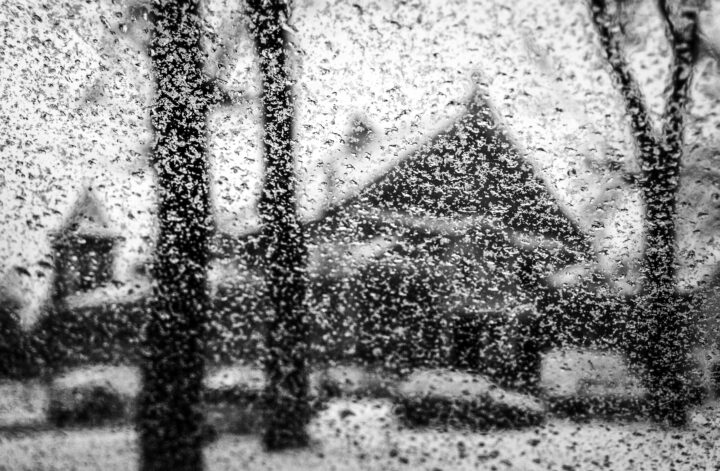On walking through the city on an unusually sunny day in late January, I lost count of the number of people sitting silently on benches with their faces turned towards the sun, drinking it in like bees do nectar. It was a simple, primeval, eternal human reaction which warmed my pagan heart. They are bang on time. The 1st February marks the pagan festival of Imbolc, the part of the wheel of the year which marks the very nascent beginnings of Spring, and which Czechs celebrate as Hromnice. On Imbolc, the stories tell us, the ancient crone goddess of winter, the Cailleach, is replaced by the maiden Brigit who walks the earth in her green cloak, breathing life into the trees and melting the ice on rivers. And although it is only February and snow still lies thick around us, the dream of Brigit and Spring is once again real and stirring.
The theme of repetition and returning to where we started is represented to me most strongly by the wheel of the year and the changing seasons, which we tread year after year our whole lives, and without which, I would argue, we would not be our fullest selves. Many people who live in countries with specific seasons dread the winter, but arguing in defence of the cold months comes easily to me. I was born in September and feel most myself in Autumn, with Winter a close second (although after a decade of living outside of the United Kingdom, I have learned to enjoy warm weather and dry feet too). But I would like to argue that our yearly passage through the four seasons is actually deeply important to all of us:
- Winter is the night to summer’s day. We need to sleep each night to rest and to grow. Without huddling up and shutting down we cannot process the many impressions and lessons of the day and absorb them into our selves. Most importantly, it is at night that we dream and new things are conceived. Imbolc means “in the belly”, the word is presumed to derive from old Gaelic and refers to the time of year when sheep were pregnant with the future lambs of Spring. To me summer is the bursting forth of everything that has been slowly kindling and growing in the fertile dark of the cold months. With no deep winter all we can give out would be shallow, repetitious and without spirit.
- Many important things are only made clear by their opposite. Would I have witnessed such deep, spiritual reverence for scraps of sunlight in midsummer? Of course not. By then we are sick of the heat, we cross the street to avoid it. Similarly, there is the joy of the first cooling breath of Autumn, which allows you to think clearly again and to attempt more challenging exercise than just scuttling for shade. This is one of the things I love about Paganism, the constant dance of opposites. The summer solstice is the most glorious, full day of summer, a day when it seems the light will never end, but it is actually just that ending – from then on the dark creeps slowly back in. At winter solstice we are still huddled and homebound but the inception of summer is born. Every high is also the start of a low and vice versa. This knowledge is bleak and hopeful at the same time.
- We are different people from season to season. How could we know ourselves thoroughly if it were warm and sunny all the time? In summer everybody is a friend and there is always something to do. In winter we cling close to the few people that really matter and the cold and dark push us into simpler, more introspective activities. The city is different too. I avoid some playparks in winter because they are always in the shade and freezing cold, but these are the ones I seek out in summer. In the same way, the seasons allow us to inhabit and enjoy all the different places within ourselves.
I know, however, that many people would cheerfully say farewell to winter forever. Reactions to my reverence for the difficult dark months include that “winter is cold, miserable, dark. Life feels hard, just pushing on. We get depressed. It feels like endless waiting. Why not just live in a place like Ecuador, where the weather is fairly constant the whole year round, where you can rely on warmth? And what’s more people are nicer in warmer places, they are friendlier, more open, happier. Wouldn’t we all be happier if we could just banish winter forever?”
So I asked Gabriela, an Ecuadorian now living in České Budějovice, if life is really better in a land with no winter: “There are lots of things that are great in a place that is always warm. There are changes in Ecuador, especially in the mountains, but just not so distinct. You could say we have just Spring and Autumn. When you have free time, the weather is always nice so you can do things outside. And it is true that people are happier in the sun. I feel the same when the weather is warm, I am more extrovert, I smile more, I help others more. When winter comes here in Europe, I feel I become more introvert, you feel more isolated, you see hardly anybody. Winter can be really depressing”
“But I have to say I would miss the changing seasons if I moved back to Ecuador now. I love change. And maybe we are more adaptable in the Czech Republic as we live through a range of weathers. In lots of hot countries many people have never experienced the magic of snow and are freaked out by it. Whereas my kids love to ski. But I think what really made the difference for me in accepting the changing seasons was becoming a mother. When I was young and unmarried, I disliked the winter more. If it was cold and windy, I would simply stay in. With young children you are forced to be out in all weather. If it is windy you fly a kite, if it’s raining you jump in puddles. And what’s more you move so slowly you have time to really look at all the changes that are happening, in the trees, in the landscape. My children are in school now and I am back at work so I live like the rest of the population, I rush through the outside world to get to where I am going. But that brief interlude of being with small children all the time taught me to look at the natural world more closely.”
Like Gabriela, I am out with my sons in all weathers. But many of the older members of my family really hate winter. The obvious reasons are that it is physically more challenging – the body aches more, people get sick, there are greater risks of falling on snow and ice, they lose their confidence. But possibly it is also psychologically more difficult to face winter in old age, when its reminders of death and decay are most frightening. Whereas enjoying it with young children, though tiring, brings constant reassurances of life, youth and eternal renewal.
I spent a very happy Imbolc with my children and their friends on 1st February, amidst the whirling snow and the wolf winds. I like to stay connected to the wheel of the year and the knowledge that all of our small lives are part of something more ancient, magic and eternal. Spring is “in the belly” at Imbolc, even if the signs are still very faint. But we were celebrating not only that this winter is ending but also that, one day, it will come again.
Photo: Lenka Pužmanová



